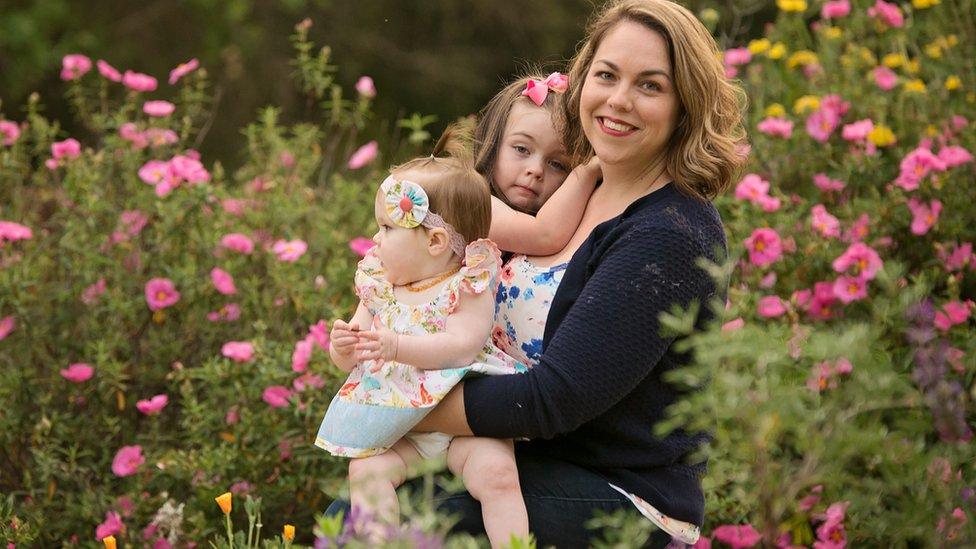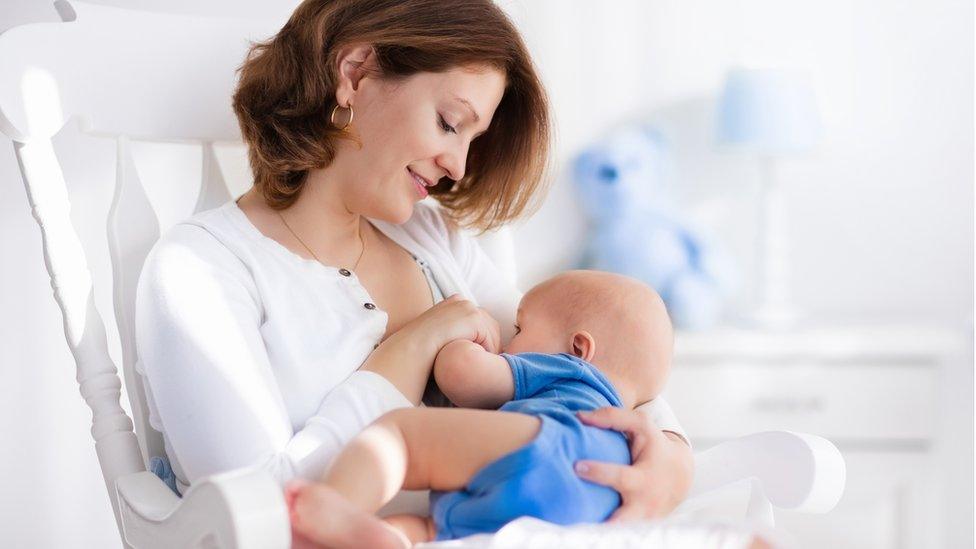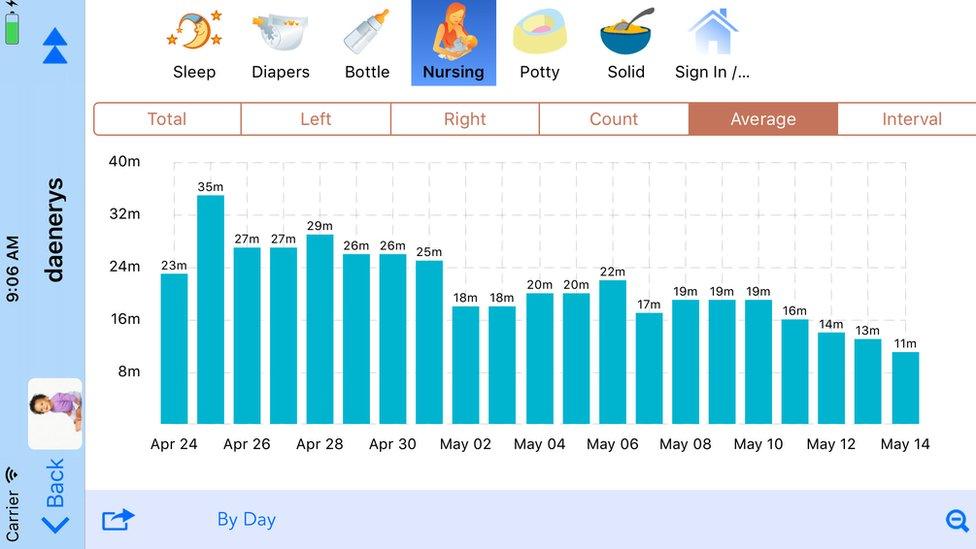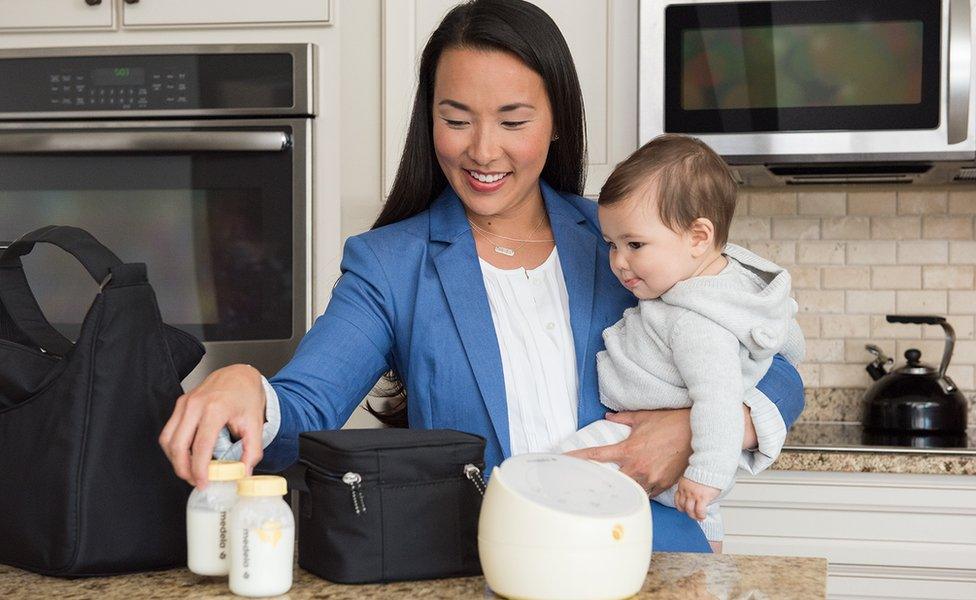Do mums really need breastfeeding help from technology?
- Published

Ashley Albert used a breastfeeding app to help her keep track when nursing her girls
Caring for a new baby can be an overwhelming experience - there's lots to cope with and keep track of. And breastfeeding isn't as easy as it looks. Can technology help new mums or is it just another layer of complexity in an already hectic life?
Ashley Albert, 34, from Sacramento, California, is a real estate executive and the proud mother of Kayley and Teagan, both under four years old.
She says she found using Baby Connect, an app that helps parents record breastfeeds, nappy changes, sleep times and so on, very useful.
"The newborn days are such a blur - you're in survival mode - so having something to look back to was essential," she says.
"It helped me with knowing how long in-between feedings my baby had gone, what side she last fed on - because I could never remember - and for how long she was averaging."
The advantages of breastfeeding are well-known, with medical bodies across the world recommending the practice for the health benefits it provides both babies and mothers.

Some mums find breastfeeding difficult - but can tech help?
But many mums find it difficult and painful, then struggle with feelings of guilt if they can't feed their baby naturally.
So it's no wonder that Baby Connect is just one of scores of breastfeeding tracking and advice apps available for download in a fast-growing market forecast to grow from $36m (£28m) in 2015 to nearly $250m (£194m) by 2020, according to MarketsandMarkets.
In 2016, breastfeeding was the second fastest-growing category on Amazon.com in the baby product sector, behind only portable cribs.
And the baby care market generally is forecast to grow from $11bn this year to more than $13bn in 2021, according to research consultancy Trefis.com.
One advantage of such apps is that all the recorded data can be automatically synchronised across devices - including those of other carers you authorise - and you can set up alarms to help plan your day.
Mind you, babies are pretty good at setting their own ear-splitting alarms to let you know when they need something.

Baby care apps can help parents keep track of feeding times
"I used the app to log breastfeeding, pumping, diapers [nappies], growth, milestones, medical information/stats, medicines, and food," says Ms Albert.
Xavier Launay, a 48-year-old French software engineer now based in the US, says he created Baby Connect in 2008 because he wanted to help his wife manage the breastfeeding of their two kids.
Back then, all records were kept on paper at the daycare nursery and Mr Launay was convinced that digital records would be more efficient.
Today, the app has attracted 700,000 users - mostly in the US - who have recorded millions of baby interactions.
"When it's time for the paediatrician visit, parents know they can answer any question about the child's daily routine," argues Mr Launay.
Alex Ooi, creator of the Feed Baby app, says he didn't see it as a business opportunity at first, more as a way of helping his partner. Now the app has been downloaded nearly two million times by users in the US, UK, Australia, Canada and Russia.
More Technology of Business
He thinks that there is an opportunity for such tech to help new parents receive the advice they need.
"From what we've seen there is probably more that could be done to help connect medically certified professionals with new parents via tech," says Mr Ooi.
But not everyone is convinced of the benefits of such apps.
"One of the major drawbacks of many such consumer apps is that the data collected does not provide meaningful insights," says Brahadeesh Chandrasekara, a health industry analyst at research consultancy Frost & Sullivan.
"The data do not guide the mother or families if the numbers are outside the desired range.
"There is a need for apps that can provide meaningful insights to the mother, families and the providers on the data gathered, as such valuable insights can help in identifying the root cause of a problem."

Medela's "smart" breast pump aims to mimic a baby's sucking action
For decades now, new mums have used breastfeeding pumps to help their babies receive the health benefits of breast milk but delivered from a bottle. But traditional designs often made women feel like ungainly milch cows.
About 13 million women use them worldwide, but some analysts are predicting an 11% increase in the market by 2022 as the technology improves.
"Though many women find them convenient," says Mr Chandrasekara, "these devices are known to be noisy and bulky, which can make them uncomfortable. So innovation is focused on reducing their noise and size."
Leading breast pump makers include Philips, Lansinoh, Ardo, and Avent. But one, Medela, a Swiss company founded in 1961, has developed Sonata, a "smart" breast pump costing $399.99 (£300).
"Based on clinical and academic lactation research, Medela developed a two-phase technology, an advanced algorithm that creates a vacuum pattern which emulates a baby's natural suckling behaviour," says Stephen Flint, the firm's chief technology officer.
An accompanying app, MyMedela, tracks breastfeeding and pumping sessions, as well as other metrics, such as the baby's height, weight, sleep patterns, and nappy changes.
"Sonata and MyMedela are meant to function as a complete support system that puts a mum in control of her own schedule, so that she can breastfeed, and continue to lead an independent, dynamic life," says Mr Flint.
"A mum doesn't just take care of her baby, she has a life to live, and other goals to pursue. If she gets help and support, she can most easily combine breastfeeding with her other goals."
Follow Technology of Business editor Matthew Wall on Twitter, external and Facebook, external